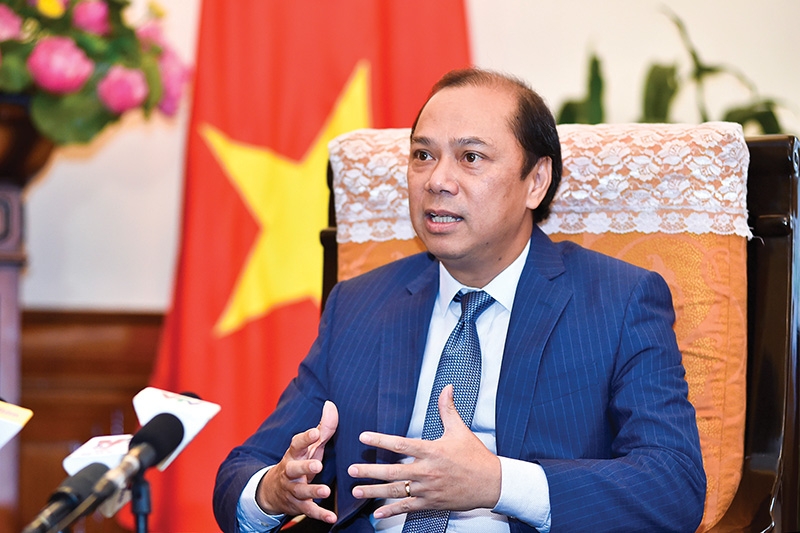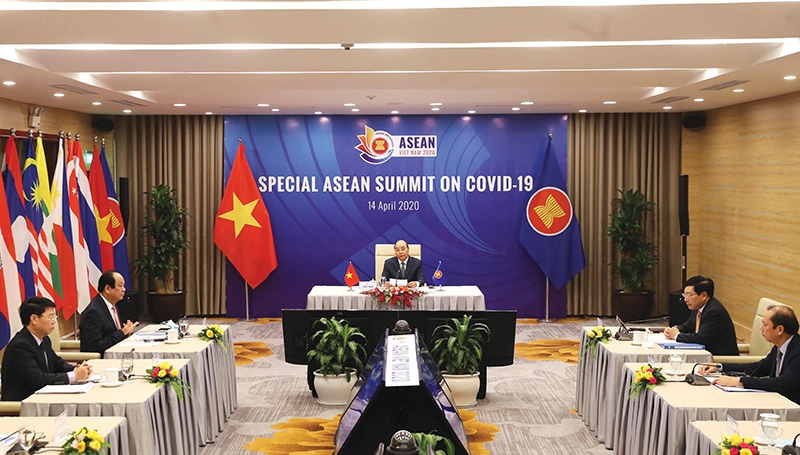ASEAN continuing with tasks at hand
 |
| Nguyen Quoc Dung, Deputy Minister of Foreign Affairs |
This year there were due to be more than 1,000 events on co-operation within the ASEAN and between the bloc and its partners. Being the ASEAN chair, Vietnam had made thorough preparations for organising such events, with many plans, priorities, and expected outcomes for the whole year.
However, the COVID-19 pandemic has been imposing negative impacts on the bloc’s plans. Regional nations and those throughout the world have had to place their priorities and resources on fighting against the pandemic.
According to the ASEAN Secretariat, more than 200 activities of the ASEAN have been either delayed or cancelled so far. However, Vietnam under its role as the ASEAN chair has been making its greatest efforts to maintain the bloc’s activities via many methods, and ensure expected outcomes from these activities.
Shifting core of ties
This year, Vietnam has advanced a theme of “Cohesive and Responsive”, in which being cohesive reflects the need to enhance ASEAN unity and solidarity, economic integration, ASEAN awareness and identity, and work toward a people-centered community.
Meanwhile, being responsive underlines the importance of promoting ASEAN pro-activeness, creativity, and capacity in response to opportunities and challenges brought about by rapid changes in regional and global landscape.
Being cohesive and responsive is quite correct now in the context of complicated developments in the global situation including the COVID-19 raging worldwide. With such a spirit, efforts by Vietnam have been widespread.
First, Vietnam has taken the initiative in shifting the core of ASEAN co-operation and priorities. When all regional nations have been focusing on reining in the pandemic, we have also been following suit. For example on February 14, after we consulted with the bloc’s member states, we also took the initiative in advancing a declaration of the ASEAN chair, determining that the bloc’s co-operational priority will be to fight against the pandemic.
Second, Vietnam has also been active in organising and leading specific activities of the ASEAN to the combat against COVID-19. Vietnam held a meeting of the ASEAN Coordinating Council, which is in charge of hosting and coordinating the bloc’s anti-pandemic activities.
We organised a meeting in Vientiane, capital city of Laos, on February 20. The meeting determined that an inter-sectoral taskforce of the ASEAN will be established. The taskforce’s members include representatives from ministries and agencies, including the ministries of defence, public security, health, transport, and information and communications.
The taskforce on March 3 gathered a meeting discussing specific measures to both cope with the pandemic and ensure people’s lives, reducing negative impacts of the menace. Results from the meeting were used for the organisation of several meetings which have adopted a series of solutions to fight the pandemic and reduce its impacts on socio-economic development of the member states, while making preparations for economic recovery after COVID-19 ends.
Third, Vietnam has also hosted and boosted relations between the ASEAN and its partners in preventing and combating the pandemic. We have organised a series of meetings with partners including the US, China, the EU, Japan, and South Korea. These nations have highly appreciated these efforts by Vietnam.
Fourth, in addition to curbing the pandemic, Vietnam has had used different methods to maintain all activities of the ASEAN, including the continued preparation of meetings, possibly online, in order to maintain the results in the year, while continuing preparing for physical meetings that will take place from now until the year’s end.
 |
| Summits have been convened involving all ASEAN states as well as leaders from South Korea, Japan, and China |
Fighting the pandemic
On April 14, the Special ASEAN Summit on COVID-19 and the Special ASEAN+3 Summit on COVID-19 released two declarations on fighting against the pandemic.
The promulgation of the declarations within a very short period of time has demonstrated great efforts of all member states and the importance of the declarations. This has been a political commitment made at the highest level of the ASEAN, as well as of the ASEAN with South Korea, China, and Japan on solidarity and mutual support in jointly pushing back the pandemic.
This is also a strong message sent to the public that they are protected in health and social security, with equal treatment everywhere. Enterprises, especially small- and medium-sized ones, are also assisted by the state so that they can maintain their production and business activities, and can recover their development.
The enactment of the two declarations also manifests close co-operation among the member states who will find it more confident in their anti-pandemic battle because of support from other nations. They will also be able to receive more resources, including financial assistance, for bringing the pandemic under their control.
In addition, the declarations also demonstrate support from regional nations and of the ASEAN+3 for multilateralism and the multilateral trade system, as well as for the liberalisation and flows of global supply chains.
When the pandemic broke out, all nations had to apply strong measures to curb it, with the limited travelling of people, isolation, and even lockdowns of some locations. Borders have also been shut down at different levels, while almost all commercial flights have been cancelled.
This has affected livelihoods everywhere. In this context, all ASEAN nations have come to an agreement that these measures will be gradually removed under suitable roadmaps on fighting the pandemic. At the same time, the countries have also used financial packages and bailouts to support those hit by COVID-19, so that people and businesses can stay afloat amid such great difficulties.
The nations have also agreed that they need to maintain a supply chain that can help ensure the provision of goods, especially indispensable goods, foodstuffs, and necessary healthcare equipment. They have also underlined their support for multilateralism, meaning that all agreements and documents already inked must be implemented fully in order to beef up the trade co-operation within the bloc and between the bloc with its partners. Other issues, such as the completion of negotiations and inking of the Regional Comprehensive Economic Partnership, must also be completed.
Leaders have also determined that we must host the formulation of a master plan on an ASEAN recovery after the pandemic ends. This is a very difficult task, and Vietnam is now working with other regional nations to build up this master plan.
Sharing experience
The nations want Vietnam to share its experience in controlling the pandemic and in fact, at conferences and forums, Vietnam has done that. We have been actively contributing to the development of the ASEAN via specific activities, such as online practices, and development of a network of healthcare experts. Vietnamese healthcare experts will join the network in different groups so as to share experiences in treatment, diagnosis, and mapping out treatment plans.
In 2020, Vietnam and other ASEAN member states will have to do more to further cement their common solidarity. If we want to remain cohesive, we would need glue. Firstly it is the mutual benefits, so the bloc needs to have specific mechanisms in order to meet all benefits. Economically, the ASEAN must create shared prosperity. That’s why we have had to be beefing up intra-trade co-operation with enhanced quality. That is one of the priorities of Vietnam this year and, moreover, it is necessary to further support the lives of all people in terms of economy, culture, and value. More importantly, we need to raise people’s awareness of the ASEAN Community, which can bring them lots of benefits.
What the stars mean:
★ Poor ★ ★ Promising ★★★ Good ★★★★ Very good ★★★★★ Exceptional
Themes: Drive ASEAN Forward
Related Contents
Latest News
More News
- NAB Innovation Centre underscores Vietnam’s appeal for tech investment (January 30, 2026 | 11:16)
- Vietnam moves towards market-based fuel management with E10 rollout (January 30, 2026 | 11:10)
- Vietnam startup funding enters a period of capital reset (January 30, 2026 | 11:06)
- Vietnam strengthens public debt management with World Bank and IMF (January 30, 2026 | 11:00)
- PM inspects APEC 2027 project progress in An Giang province (January 29, 2026 | 09:00)
- Vietnam among the world’s top 15 trading nations (January 28, 2026 | 17:12)
- Vietnam accelerates preparations for arbitration centre linked to new financial hub (January 28, 2026 | 17:09)
- Vietnam's IPO market on recovery trajectory (January 28, 2026 | 17:04)
- Digital economy takes centre stage in Vietnam’s new growth model (January 28, 2026 | 11:43)
- EU Council president to visit Vietnam amid partnership upgrade (January 28, 2026 | 11:00)

 Tag:
Tag:




















 Mobile Version
Mobile Version